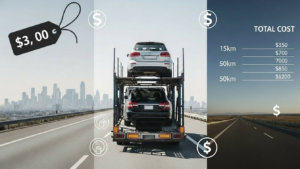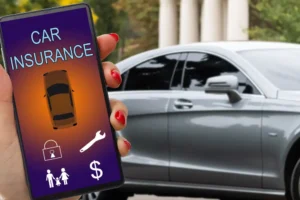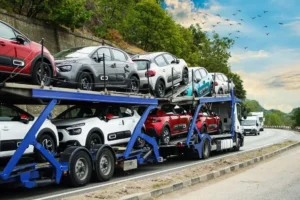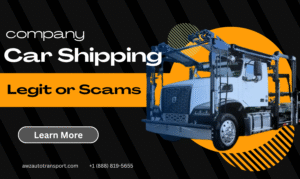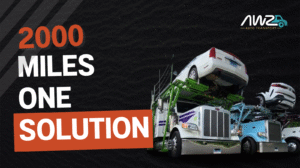How to Know if a Car Transport Company is Legit?
Written by: Auto Shipping Specialist
Verify the FMCA and DOT numbers provided by your car transport company. Go through their reviews and BBB accreditation to validate their authenticity. You can also identify if your car shipping company is legit or not by getting a quote and checking their pricing. There are a lot of companies claiming to be the best auto shipping company across the United States but not everything they claim is true. Get your facts on track and only trust the real car transported for your vehicle moves.
Don’t risk your vehicle with unverified shippers. Choose a trusted auto broker to move your vehicle from one state to another. AWZ is a BBB-certified auto transport company you can trust. Get your personalized shipping quote today!
What The Things You Need to Check – Steps
Verify the license of the car shipping company and check their legal status. You can easily avoid the car shipping scams by noticing the following:
The License Verification That Actually Protects You
Every legitimate car transport company in the United States must have specific federal licenses. These aren’t just bureaucratic paperwork—they’re your protection against fraud and inadequate insurance coverage.
The USDOT Number identifies the company with the Department of Transportation. Every legitimate carrier must have one displayed on their website and on their trucks. MC (Motor Carrier) Number authorizes them to transport vehicles for hire across state lines.
To verify in 30 seconds, visit safer.fmcsa.dot.gov and enter the company’s DOT or MC number. Check their operating status shows as “Active” and verify their cargo classification includes “Motor Vehicles.” Some companies register for hauling construction materials or produce but aren’t authorized for vehicles. This matters because their insurance won’t cover your car if something goes wrong.
Federal minimum insurance requirements are $750,000 for cargo and $1 million for liability. But here’s what most people don’t know: that cargo coverage might need to cover an entire truck load of vehicles, not just yours.
Ask these specific questions:
- “What’s your per-vehicle cargo coverage limit?”
- “Can you email me a current certificate of insurance?”
- “Does your policy cover my vehicle’s current market value?”
Legitimate companies provide this information immediately. Scammers stall, dodge, or provide fake certificates.
Price Verification: The Math Behind Legitimate Quotes
Car transport costs follow predictable formulas based on distance, route popularity, vehicle size, and seasonal demand. Understanding this helps you spot unrealistic pricing.
Distance runs approximately $0.60-$1.20 per mile for a 1000 miles distance, depending on route. Vehicle type affects cost, with larger vehicles costing 10-20% more. Transport method makes a difference, as enclosed shipping costs 40-60% more than open transport. Route popularity matters significantly, with remote areas costing much more. Timing impacts price, with summer and winter moves costing 15-25% more.
Get quotes from 4-5 companies. Remove the highest and lowest quotes. If the remaining three quotes fall within $200 of each other, you’re likely dealing with legitimate companies pricing competitively.
Here’s a red flag example: If four companies quote $1,200-$1,400 for your route, and one company quotes $800, that $800 quote is designed to hook you. They’ll either hit you with surprise fees later or assign your car to an uninsured carrier who cuts corners on safety.
The Communication Patterns of Professional Companies
Legitimate transport companies communicate differently from scammers. They sound experienced rather than desperate for your business.
Professional companies explain realistic timelines. They’ll tell you pickup windows are typically 1-5 days and delivery times are estimates, not guarantees. Weather, traffic, and mechanical issues affect schedules. They explain that your car will likely get dusty on an open trailer and that enclosed transport costs significantly more but provides weather protection.
Scammers make unrealistic promises. They guarantee specific pickup dates, promise pristine vehicle condition, and claim to be “the highest-rated company” without evidence. They create artificial urgency with statements like “This price expires in 20 minutes” or “We have a truck leaving tomorrow.
Contract Terms That Protect You vs Terms That Don’t
Reading your transport contract protects you from surprise fees and unclear responsibilities. Here’s what legitimate contracts include.
- Payment structure should require a small deposit at booking (typically $100-300) with the balance due at delivery via cash, cashier’s check, or money order to the driver. Avoid companies demanding full payment upfront or requiring wire transfers.
- Cancellation policy should allow you to cancel without penalty before pickup, with your deposit refunded minus any credit card processing fees. Scam companies often have no-refund policies or charge excessive cancellation fees.
- Damage claims process should clearly explain how to report damage, time limits for claims, and the company’s insurance carrier information. Professional companies provide claim forms and adjuster contact information upfront.
The Better Business Bureau Reality Check
BBB ratings provide insight into how companies handle customer complaints, but they’re not foolproof. A+ ratings don’t guarantee perfect service, and newer companies might not have ratings yet.
Look at the pattern of complaints rather than just the rating. Even excellent companies receive complaints, but legitimate companies respond to them professionally and work toward resolution. Check if complaints involve the same issues repeatedly, like bait-and-switch pricing or damaged vehicles.
Pay attention to how the company responds to negative reviews. Professional companies acknowledge problems, explain what happened, and describe how they resolved the issue. Scam companies either don’t respond or provide generic responses that don’t address the specific complaint.
The Phone Test That Reveals Everything
Your initial phone call reveals more about a company’s legitimacy than any website or review. Professional companies answer calls during business hours with knowledgeable staff who can discuss routes, timing, and pricing without high-pressure sales tactics.
Ask about their claims process, insurance coverage limits, and what happens if your car is delayed. Legitimate companies explain these details clearly because they deal with these situations regularly. They’ll provide references from recent customers if requested.
Red flags during phone calls include reluctance to provide DOT/MC numbers, inability to answer basic insurance questions, high-pressure tactics to book immediately, or connecting you to multiple “managers” who each offer different deals.
Car Broker Vs. Carrier | Which One is For You?
Most car transport companies operate as brokers, not direct carriers. This isn’t necessarily bad, but understanding the difference protects you from certain scams.
- Brokers arrange your shipment and assign it to a carrier in their network. They handle customer service, quotes, and problem resolution.
- Carriers own the trucks and actually transport your vehicle. Many carriers focus on driving and don’t handle customer acquisition.
Legitimate brokers maintain relationships with vetted, insured carriers. They verify each carrier’s licenses and insurance before assigning shipments. Scam brokers either don’t verify carriers or assign loads to whoever accepts the lowest price, regardless of their credentials.
Ask brokers about their carrier vetting process. Professional brokers can explain how they qualify carriers and provide backup plans if assigned carriers don’t perform.
Conclusion
Choose a well-reputed car shipper after analyzing their legal status to work in the United States. Many companies fake their license numbers and reviews. Don’t fall for them without a detailed conversation and a documented quote. Scammers create urgency because they don’t want to miss any chance of trapping customers. Remember! The key is not to hurry and verify every single detail on your own. Many supernatural claims aren’t practically possible so don’t trust anything that is too good to be real.
Now that you know what a legit company looks like, contact us as your reliable car shipping partner and avoid scams or fake claims.


